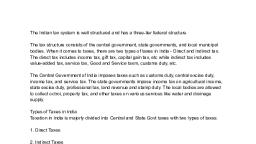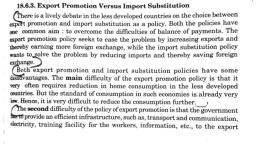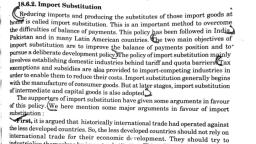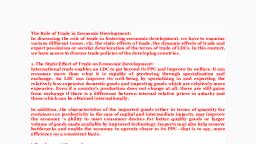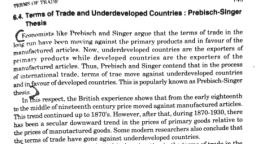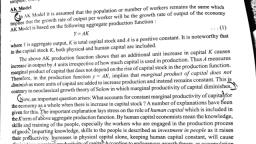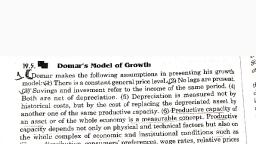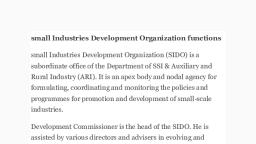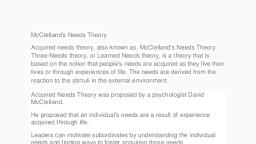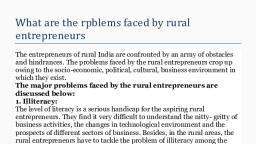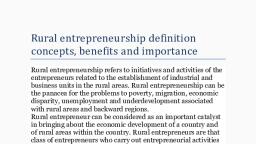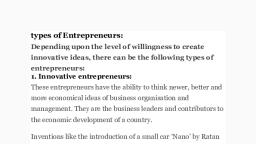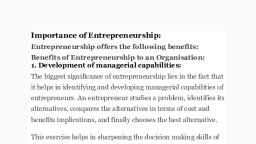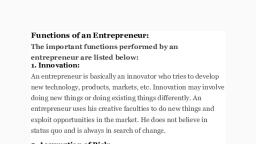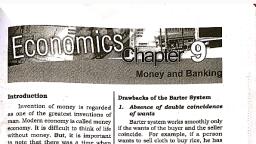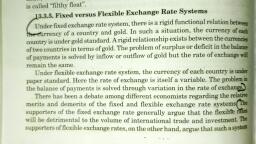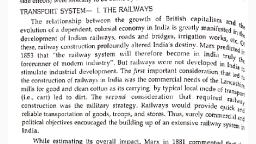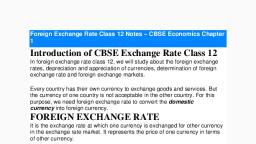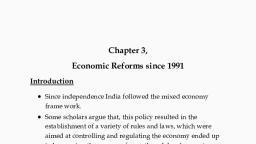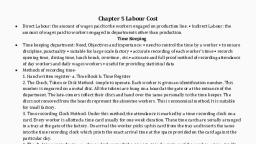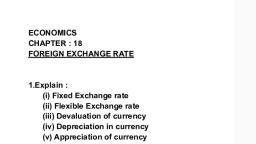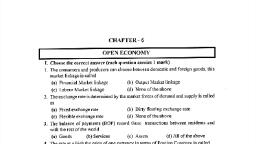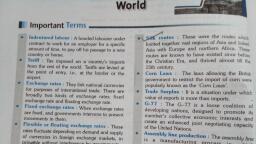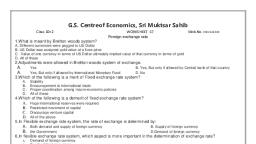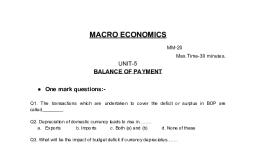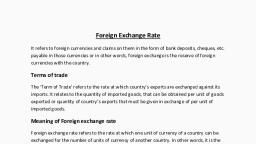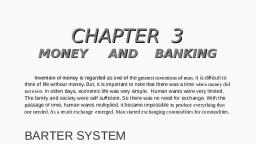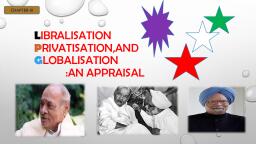Page 1 :
chapter ACCU Ae, inst Fixed Exchange Rate, , 13.3.3. Cases for and aga, Under fixed or pegged exchange rate system, the exchange rate is determined, , by the monetary authorities. The authorities may af the exchange rate by, legislation or intervention in currency markets. All exchange transactions take, at the rate determined by the monetary authorities., , Cases for / Advantages / Merits : Fixed exchange rates have the following, advantages :, , 1. Under fixed exchange rate system, countries have a fixed value of their, currencies in relation to other currencies. This makes prices of goods more, predictable. This again encourages trade. It also promotes economic integration., , 2. Fixed exchange rate system encourages long term capital flows in an orderly, and smooth manner. In this system there is no uncertainty and risk arising, , from fluctuations in exchange rates., 8. Under a system of fixed exchange rate, there is no fear of currenty, , —
Page 2 :
_— alee, , apsUSTMENTS IN BALANCE OF PAYMENTS 341, , depreciation or appreciation, It removes fears that holding large amounts of, foreign currency might lead to losses if'a currency’s value drops. Thus it creates, confidence in the strength of the domestic currency,, , 4. There is no fear of any adverse effect speculation on the exchange rate., Under fixed exchange rate, speculative activities are controlled and prevented, by monetary authorities,, , 5. Fixed exchange rate, on monetary, , , , , , em serves as an ‘anchor’. It imposes a discipline, authorities to follow responsible financial policies within countries., , 6. According to Johnson, flexible exchange rates lead to a perpetual chase, between inflation and depreciation when the exchange rate falls. But fixed, exchange rate system does not have this problem., , Cases against / Disadvantages / Demerits of Fixed Exchange Rate :, , Following arguments are given against fixed exchange rate system., , 1. Under fixed exchange rate system, the objectives of full employment and, stable prices are sacrificed at the altar of stable exchange rates., , 2. A country under fixed exchange rate may be protected from disturbances, in the domestic economy, but it has to bear a share of the burden of the, disturbances and mistakes of others., , 3. Under fixed exchange rate system, large reserves of foreign exchange are, to be maintained. This is wasteful. This resource could be used for economic, development of the country., , 4. A system of fixed exchange rate requires complicated exchange control, measures. This leads to misallocation of the economy’s resources., , 5. The exchange rate of a country vis-a-vis another country cannot remain, fixed for long period. Balance of payments problems and fluctuations in, international commodity prices may compel a country to bring changes in, exchange rates., , For all these reasons the system of fixed exchange rate is discarded today., , 13.3.4. Cases for and against Flexible Exchange Rate, , , , , , Flexible, floating or fluctuating exchange rates are determined by market, forces. Here the monetary authorities do not intervene to influence the exchange, rate. The exchange rate is determined by demand for and supply of foreign, exchange. If there is an excess supply of a currency, its value in the foreign, exchange market will fall. Then its demand will rise and supply will fall. As a, result, equilibrium will be restored in the exchange market. On the other hand,, if there is excess demand for a currency, its value will appreciate and again, equilibrium in the exchange market will be restored. These market forces operate, freely. Monetary authorities do not intervene in them., , Cases for / Advantages / Merits of Flexible Exchange Rate :, , 1. Flexible exchange rate is simple in its operative mechanism. It eliminates, the problem of surplus or deficit of a currency. : :, , 2. Under flexible exchange rates, the adjustment is continual. Hence,, adjustments in the balance of payments are smoother and painless as compared, with the fixed exchange rate system. ‘, , 3. Under a system of flexible exchange rate, autonomy of the domestic, economic policies is reserved. The objectives of full employment and economic
Page 3 :
342 INTERNATIONA, ECON, , growth are not to be sacrificed in order to maintain balance f, equilibrium. oF Pay, 4. Under flexible exchange rates, disequilibrium in the balance of, is automatically corrected. Hence there is no need to accomm Paym,, tovements and capital flows in and out of countries, odate Bold, 5. Under flexible exchange rate system there, reserves of foreign exchange. Hence the system i, the case of fixed exchange rate system., 6. The system of flexible exchange rate does not r, , YMent,, , is no need to Main:, , tain, S not costly or was lan, , teful a8 in, , equire complicated po}:, of exchange control and trade restriction, ae, 7. Under flexible exchange rate system, there will be no competitive exchange, rate depreciation., , Cases against / Disadvantages /Demerits of Flexible Exchange Rate:, , 1. Critics of flexible exchange rate system argue that market mechanism, may fail to bring about an appropriate exchange rate., , 2. It is difficult to define a freely flexible exchan, System is fully free of official intervention., , 3. Sometimes market does not provide correct signals. In that case, flexible, exchange rate system may lead to wrong decisions and misallocation of resources., , 4. Flexible exchange rate system creates uncertainty. It impedes international, trade and capital movements., , 5. Flexible exchange rate encourages speculation, and in some cases, speculation may be destabilising., , 6. Flexible exchange rate system is inflationary. A fall in exchange rate cannot, reduce price level because wages and prices are rigid in the downward a, , For the difficulties associated with both fixed and flexible exchange ™ et, most countries of today’s world follow a system of managed flexibility or ee, floating. The exchange rate is not allowed to float freely by market forces, , : ion is heavY, float), there is government intervention ( dirty float). If intervention 18 h, is called “filthy float”., , ge rate. No exchange rate
